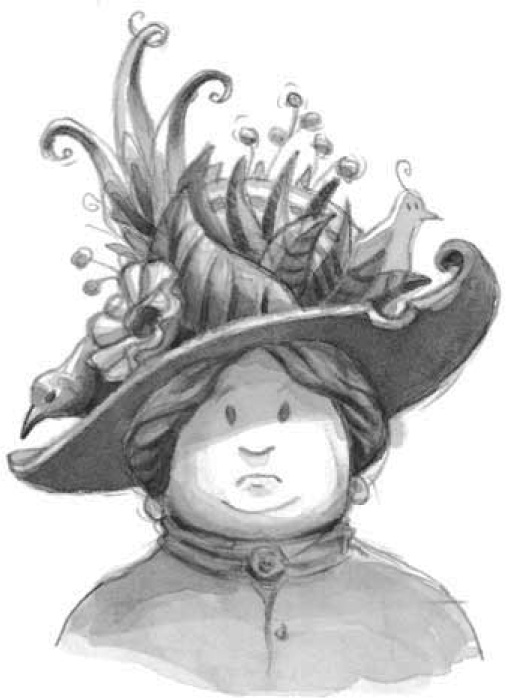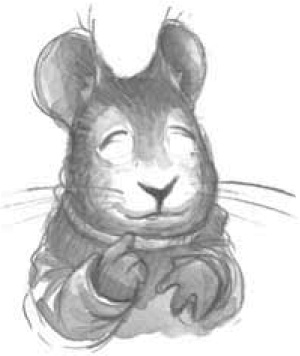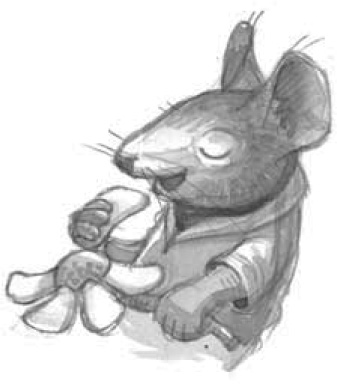Bless this Mouse (4 page)
Authors: Lois Lowry

"Well," Hildegarde went on, "the sexton was teasing her a little, I think. He told her to watch out if she took that hat off and set it down, because it looked like a good nest for mice, and he'd seen a mouseâ"
"It
would
be a great nest!" squeaked a youngster who'd been perched on the arm of the deep red sofa. "If she ever puts it in the rummage bin, we should grab it!"
Hildegarde glared again. She hated interruptions. When they were silent, she continued. "He told her he'd seen a mouse that morning in the kitchen, under the sink."
"Oh dear, oh dear. That was me." A large male mouse stood up on his back legs, raised one front paw, and continued his confession. "I came up beside the water pipe. I was going to grab part of an SOS pad and take it back to my nest. I like a little firmness to my bed. But just as I got there, someone opened the cabinet door and reached in for a sponge. So I took off. I didn't realize he'd seen me.
"I'm so, so sorry. Does it mean the Great X? Please, no!"
"Shhh. Let me finish. I heard the sexton describe that sighting to the Bad Hat Lady, and he said, 'We seem to have a mousie in the church. Someone saw it last night in the ladies' room.'"
"A
mousie?
" Dozens of them repeated the word, tittering.
"Shhh!" Hildegarde admonished them sternly. "Finally, last night, as he was leaving for the rectory, Father Murphy said to the sexton, 'That mouse really gets around. I saw him scoot across the hall when I went to the men's room!'"
"Him?
Him?
" Millicent sounded outraged. "Does that man not recognize a nursing mother when he sees one? I was hurrying home to the mouselets. All right, I shouldn't have crossed the hall in broad daylight, I know thatâ"

"
Hush,
" Hildegarde said. "I am simply pointing out a very fortunate thing. Three different peopleâ the AA lady, the sexton, and Father Murphyâsaw three different miceâ"
"Me," the three guilty mice said in guilty unison.
"âbut they all think they saw the same mouse! They think Saint Bartholemew's has
one mouse!
"
"Instead of
hundreds!
" Roderick called out gleefully. Around the room, from their various perches on shelves and sofas and table, two hundred and eighteen (one had not attended; he was old, and sleeping) church mice applauded with their little paws. Mouse paws are softly padded, so applause is a muted, muffled sound. But the congratulatory clapping together of several hundred paws does make a distinctive noise. Hildegarde allowed them their moment of jubilation before she called for quiet.
From the corner of Father Murphy's office, a tall clock chimed four. It was still dark, pre-dawn. Roderick yawned.
"I'll let you go now," Hildegarde said. "But I want you to understand that we must maintain this illusion. We must be as
one mouse.
We must not be revealed as the multitude that we are.
"Keep yourselves hidden!" she instructed them as they clambered down from the shelves and prepared to leave. "At all times! Otherwise..."
They knew how to fill in the blank. "The Great X," they murmured ominously as they spread out and began to scamper in great numbers down the halls and aisles and passages of the church.
"And all of you?" Hildegarde called after them. "Please! Pray for sun on October fourth!"
"
Pray for sun on October fourth!
" A sarcastic voice mimicked her. Hildegarde turned and saw her enemy, the mouse she most loathed. Lucretia, sneering casually, turned and strolled down the aisle, her wide rump swaying.

Hiding from Father Murphy

The life of a mouse can for the most part be described in verbs.
Arrive. Grow. Forage. Eat. Sleep. Mate. Reproduce. Age. Die.
Of course, each of those verbs has subcategories. Foraging, for example, involves scampering, searching, finding, opening, nibbling, stealing, hiding, escaping, and countless other verbs involved in the nightly act of food gathering.
It is the same for all kinds of mice. The tiny pygmy mouse forages, eats, grows, mates, reproduces, and ages in the same way that the grasshopper mouse, the striped field mouse, the African climbing mouse, and the South American leaf-eared mouse do.
But a church mouse has a more complicated life.
Oh, there was so very much to tend to! It was Sunday, and Sundays were especially busy times. Hildegarde rose from her night nest behind the expression pedal of the pipe organ. She always rose very early, particularly on Sundays, when the organist arrived to practice well before anyone else had entered the church. Sometimes Hildegarde scurried away just as he came up the stairs to the choir loft. But she had never been seen, and he had never noticed her small nest there, just behind the pedal where he placed his foot when he wanted a dramatic increase in volume. Sometimes the expression pedal was called the "swell pedal" because it caused the music to swell gloriously. But Hildegarde thought that a rather vulgar term.
It was still dawn. She tidied her nest, making sure it would be invisible; then from the loft she entered the wall and descended past the main floor and down into the undercroft, where she turned right and made her way through the maze of wires and pipes, stopping here and there to check on the population. Good. They were all deeply concealed and well provided with food. Nighttime was foraging time, and after the church was darkened and silent, they had emerged, all of them, spreading out to check all the potential nourishment sources. The supply closet of the nursery was a great resource, for it contained paste, and usually the lid of the large paste jar was not tightly closed. The tips of crayons were tasty to some, though Hildegarde did not care much herself for their waxy flavor. There were always cookie crumbs in the nursery carpeting. She let the young mice have those because they enjoyed the game of it, vying with each other as they looked for morsels. Hildegarde had seen human children play the same game at Easter time, searching for jellybeans.


(And oh! The jellybeans they missed! Hildegarde particularly loved the black ones.)

The kitchen, of course, was the best location. The church ladies prided themselves on their tidiness, but if they only knew! The wastebaskets! Paper plates with sticky crumbs still attached! Packets of Splenda still half full! And in the cupboards: boxes, not tightly closed (and did it matter, really? For they could gnaw! Oh, they were excellent at gnawing!), of flour and sugar and pasta of all sorts. Father Murphy's office had a hidden cache of chocolates and gumdrops (he was supposed to be dieting), pipe tobacco (not too yummy, but some mice liked just a smidgeon occasionally), and now and then homemade cookies, which his mother sent him from Ohio. Plus, after Christmas, there were
so many
fruitcakes!

And flowers. There were flowers everywhere, in every season, and the time after weddings and funerals were particularly bountiful, though the young mice had to be reminded often that hollyberries and poinsettia leaves were poisonous. So tempting, the bright reds! But every year, despite the warnings, there was a mishap, and a sad ending for an unfortunate mouse who didn't heed the wisdom of elders.